Malaysia Scope 3 Compliance Reporting
- 17/11/2024
- Posted by: Ildar Usmanov
- Categories: Compliance, Emissions, Trends

Introduction to Malaysia Scope 3 Compliance
Malaysia’s new National Sustainability Reporting Framework (NSRF) mandates Scope 3 emissions compliance reporting for large companies starting in 2027. This regulation poses both challenges and opportunities for businesses across the supply chain, particularly SMEs. This initiative aims to enhance transparency and accountability in sustainability practices, requiring companies to measure and disclose emissions throughout their entire value chain.
Mandatory Scope 3 Reporting
The National Sustainability Reporting Framework (NSRF) in Malaysia introduces Scope 3 emissions compliance reporting for large companies, aligning with the International Sustainability Standards Board (ISSB) standards. This requirement will be phased in, starting with the largest publicly listed companies on Bursa Malaysia’s Main Market. Companies with a market capitalization of 2 billion ringgit (US$481 million) and above must begin reporting by 2027. The initiative aims to enhance transparency and accountability in how businesses manage sustainability risks and opportunities, ultimately improving business resilience. By adopting these comprehensive reporting standards, Malaysia is positioning itself at the forefront of sustainable business practices in the region.
Phased Implementation Timeline for Malaysia Scope 3 Compliance
The NSRF outlines a strategic timeline for implementing new reporting requirements, ensuring a gradual transition for Malaysian companies. Starting in 2025, approximately 130 large companies listed on Bursa’s Main Market will focus on climate-related disclosures under IFRS S1 and S2. Other companies will follow in subsequent phases, with all groups required to include Scope 3 disclosures by 2027. This phased approach extends to 2030, allowing smaller and non-listed companies more time to adapt and comply with the comprehensive reporting standards.
SME Challenges and Opportunities
Addressing Barriers to Compliance
Small and medium enterprises (SMEs) in Malaysia’s supply chains face significant challenges in adapting to the new Malaysia Scope 3 Compliance requirements. Resource constraints, including limited finances and expertise, pose obstacles for SMEs in measuring and reporting emissions accurately.
Turning Challenges into Opportunities
However, this shift also presents opportunities for SMEs to enhance their competitiveness. Those that successfully implement sustainability reporting may become more attractive to large corporations prioritizing sustainable practices in their procurement decisions. To support this transition, initiatives such as Bank Negara and Bursa Malaysia’s programs are being developed to assist SMEs in adopting ESG reporting and measuring emissions, particularly those supplying to publicly listed companies.
Key Scope 3 Categories
The implementation of Scope 3 emissions reporting in Malaysia requires companies to assess and disclose greenhouse gas emissions across their entire value chain. This comprehensive approach encompasses 15 distinct categories, as defined by the Greenhouse Gas Protocol, which can be broadly grouped into upstream and downstream activities.
Key upstream categories include:
- Purchased goods and services: Emissions from the production of products and services acquired by the reporting company.
- Capital goods: Emissions associated with the production of capital goods purchased or acquired.
- Fuel and energy-related activities: Emissions related to the production of fuels and energy purchased and consumed by the reporting company.
- Transportation and distribution: Emissions from the transportation and distribution of products purchased by the reporting company in vehicles not owned or operated by the company.
- Waste generated in operations: Emissions from the disposal and treatment of waste generated in the company’s operations.
Significant downstream categories encompass:
- Use of sold products: Emissions from the use of goods and services sold by the reporting company.
- End-of-life treatment of sold products: Emissions from the waste disposal and treatment of products sold by the reporting company.
- Investments: Emissions associated with the reporting company’s investments.
For Malaysian companies, particularly those in sectors with complex supply chains or high-impact products, focusing on these categories can yield substantial insights and opportunities for emissions reduction. For instance, manufacturing companies might prioritize emissions from purchased goods and transportation, while service-oriented businesses may concentrate on employee commuting and business travel.
As companies prepare for mandatory reporting, they will need to develop strategies for data collection and analysis across these categories. This may involve engaging suppliers, conducting life cycle assessments, and implementing robust data management systems. The process, while challenging, can lead to improved supply chain efficiency, cost savings, and enhanced stakeholder relationships, ultimately contributing to Malaysia’s broader sustainability goals
Additional important points:
- Only 21% of 975 public listed companies in Malaysia reported on the mandatory Scope 3 reporting requirements (business travel and employee commute) in their 2023 reporting cycle.
- The NSRF also mandates sustainability reporting for large non-listed companies with annual revenue of RM2 billion and above.
- Reasonable assurance on Scope 1 and Scope 2 greenhouse gas emissions will be required for Group 1 companies starting from 2027
Conclusion
Malaysia Scope 3 Compliance represents a transformative step toward enhancing sustainability practices and accountability. While the transition may be challenging, especially for SMEs, the phased implementation and available support programs provide opportunities for businesses to align with global standards. Companies that proactively address Scope 3 emissions reporting will not only meet regulatory requirements but also gain a competitive edge in sustainable business practices.
How SuSciCo Can Help
At SuSciCo, we help organizations turn sustainability challenges into opportunities. Our expertise includes:
- GHG Accounting: Comprehensive emissions tracking and reporting.
- Product Carbon Footprint (PCF) Assessments: Measuring and reducing environmental impacts across product lifecycles.
- ESG Reporting: Ensuring compliance with GRI, TCFD, and Bursa Malaysia sustainability frameworks.
- Green Supply Chain Consulting: Supporting businesses in integrating sustainable practices into procurement and operations.
Ready to take your sustainability initiatives to the next level? Reach out to us today to discuss how we can support your goals. Together, we can make a lasting impact.



